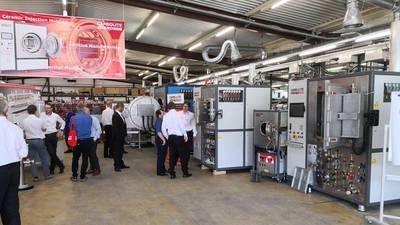CARBOLITE GERO organized a one-day seminar on Metal Injection Moulding (MIM) in Neuhausen, Germany. It was addressed to component manufacturers with longtime experience in MIM/Additive Manufacturing (AM) and an interest in new manufacturing possibilities. The combination of a technical paper on the subject of MIM & AM and existing challenges with informative presentations from various interdisciplinary manufacturing areas provided the participants with new ideas for process optimization.

Both MIM and AM are dramatically growing markets with excellent future prospects. These manufacturing processes have a clearly interdisciplinary orientation, ranging from powder production through preparation and shaping to post-treatment. CARBOLITE GERO’s MIM seminar was a successful contribution to promote interdisciplinary exchange in this field.
Prof. Dr. Carlo Burkhardt, director of the institute for strategic technology and precious metals at Pforzheim University, Germany, provided basic knowledge of MIM & Additive Manufacturing and described existing challenges in these areas. Gerhard Raatz from RETSCH Technology illuminated the possibilities of particle size and shape analysis of metal powders using Dynamic Image Analysis. In his presentation about elemental analysis Mike Lucka explained how to determine the carbon content in the finished MIM parts with analyzers from ELTRA. Elisa Götze from the Karlsruher Institute for Technology (KIT) gave some insight into researching activities in the field of additive ceramic manufacturing at the wbk Institute for Production Technology.
For the production steps of debinding and sintering, it is essential to ensure ideal gas paths in the high-temperature furnaces to ensure uniform temperature distribution. It is for this reason that simulations have to be performed to make the invisible visible and to improve details which cannot be seen. Therefore, CARBOLITE GERO works in close cooperation with the University of Pforzheim and the company Merkle & Partner GbR to improve debinding and sintering furnaces by using simulations. The basics and possibilities of simulations were presented by Dipl. Ing. Nelson Brito (University of Pforzheim) and Dr. sc. techn. Christian Mielke (Merkle & Partner GbR) in this seminar. Finally, CARBOLITE GERO introduced their entire product portfolio for MIM/CIM and Additive Manufacturing. This includes facilities for catalytic (EBO) and thermal (GLO) debinding, metallic furnaces for debinding and sintering up to 1450 °C (PDS, HTK) and facilities for stress relief heat treatment up to 800 °C (GPCMA).